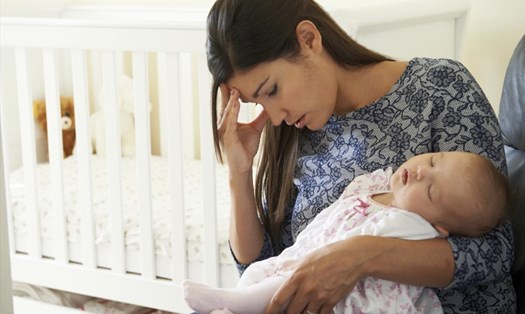Dr. Madhu Juneja - Director of Obstetrics and Gynecology at Cloudnine Group of Hospitals, Pune (India) - said that postpartum depression often includes persistent feelings of sadness, hopelessness, fatigue and difficulty bonding with the baby.
In contrast, postpartum bipolar disorder includes manic episodes, in which the mother experiences increased energy, irritability, chaotic thinking, and sometimes reckless or impulsive behavior.
The changes between manic and depressive episodes are often more intense and unpredictable in postpartum bipolar disorder, so early detection and intervention are extremely important.
Dr. Madhu Juneja points out specific differences, including:
Postpartum depression
Postpartum depression (PPD) is a type of depression that occurs in women after giving birth. It is a severe form of depression that can affect their mental health and ability to care for their children.
Symptoms include sadness, feelings of worthlessness, fatigue, loss of interest in usual activities, difficulty sleeping, and negative thinking.
Women may feel disconnected from their baby or even have thoughts of harming themselves. Symptoms of depression often appear in the weeks to months after giving birth.
As for the causes, according to Dr. Madhu Juneja, factors such as postpartum hormonal changes, stress in childcare, lack of sleep and psychosocial factors can contribute to the development of postpartum depression.
Postpartum bipolar disorder
Postpartum bipolar disorder is a form of bipolar disorder (also called manic depression) that occurs after giving birth. It is a mood condition that causes dramatic swings in mood, between periods of extreme euphoria (mania) and profound depression.
During a manic episode, women may feel very excited, energetic, have trouble sleeping, have rapid thinking, and sometimes act recklessly.
During the depressive phase, they may feel hopeless, sad, and have a lack of energy, just like in postpartum depression. However, the mood changes between these phases are very distinct.
Bipolar disorder can appear in the immediate postpartum period, but it usually begins with symptoms of mania or severe depression.
In terms of causes, in addition to biological and environmental factors, bipolar disorder can be caused by genetics, psychological instability, or the impact of other factors. Hormonal changes after giving birth can also stimulate the development of this disorder.
If you have signs of either of these conditions, it's important to consult a doctor or psychologist for a proper treatment plan, notes Dr. Madhu Juneja.











